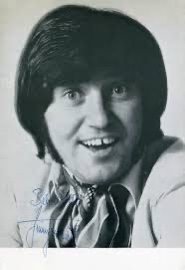
How an unlikely new broom helped the winds of change sweep through the entertainment industry in 1965
Every so often the good people at the excellent Talking Pictures TV channel resurrect a fascinating series from long ago which seems more like an architectural dig than a genuine entertainment spectacle, but no less enjoyable. And such is the case with the repeats of that stalwart of 1960s telly, Sunday Night at the London Palladium. The early episodes with a young(ish) Bruce Forsyth, when he still had his real hair, seems like being in the audience at the music hall. A succession of cloned classically trained singers, some acrobats and truly dreadful comedians kept the masses happy for many years. Well, they had little choice. However, something was about to happen in Britain which no-one in that industry at the time saw coming.
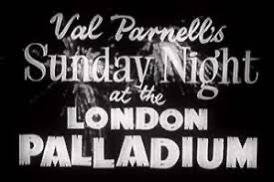
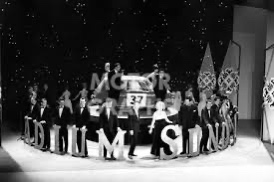
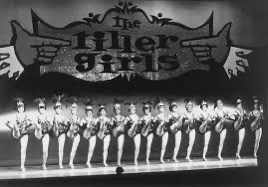
Anyone who didn’t live through the sixties will find it almost impossible to understand the impact The Beatles had on society around the world. Every shop sold something Beatles related, every sitcom or comedy programme made a reference to The Beatles, as did every drama and daily serial. Everyone was using words like ‘fab’ and kids were singing Yeah, yeah, yeah. I know I was. ‘The Beatles‘ was written throughout 60s British society like the lettering in Blackpool Rock. And by 1965 things were definitely changing in the media. And that bastion of old-fashioned variety, that throwback to the music halls, the London Palladium was beginning to realise it’s time they moved with the times. Yes, they’d had The Beatles appear there in 1963 when cheeky John Lennon asked them to rattle their jewellery, but that was as more of a novelty.
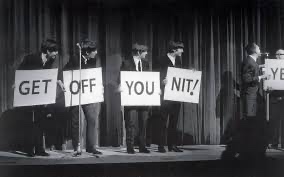
Since 1955 the show had been attracting up to 20 million viewers every Sunday night with a meat and two veg diet of the established and a few up-and-coming mainstream performers, but occasionally throwing the younger audience a few crumbs, like Cliff and The Shadows. 1965 was the year when the more traditional elements of the entertainment industry realised that The Beatles, along with a few other bands, were not a passing fad. Rock and Roll was here to stay and youth culture, for so long repressed, was now exploding all over the world. But how does a traditional, antiquated, staid Sunday night institution like The Palladium get a piece of the action to keep this clearly massive potential young viewership on board?
Step forward professional scouser, mop top and self-proclaimed friend of The Beatles, comedian, or ‘comic’ as he preferred to be known, Jimmy Tarbuck. The Beatles had put Liverpool on the entertainment map and many other acts such as Gerry and the Pacemakers, Billy J Kramer and the Dakotas, Cilla Black and The Swingin’ Blue Jeans followed. So Tarbuck ticked a number of boxes. The show featured on Talking Pictures TV recently was Tarby’s first show as the new compere in 1965 and, for me, this particular show highlighted not only the changes that were taking place in entertainment but also within society.
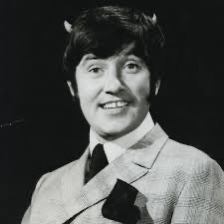
His entrance at the start of the show was an interesting calling card to the mostly conservative (with a small and probably a large ‘C’ also) audience and a signal of intention from the producers. The opening bars to the song ‘Look Out World Here I Come‘ were struck up by the Jack Parnell Orchestra and the only thing on stage was a supposed brick wall covered in graffiti with comments about the rivalry between the The Beatles and The Rolling Stones, so far, so topical, and a chalked up ‘Liverpool 5‘, just in case the Scouse associations were a bit too subtle for the southern Palladium audience. The brick wall was also a broad-brushed reference to the urban industrial, recently fashionable landscape of t’north. Suddenly Tarby crashes through the wall as if he’s exploding out of this environment and onto the sophisticated swinging London scene. He launches, slightly out of tune, into the song and dance routine with the Palladium dancers all dressed trendily like he is, although they’re all wearing stockings and high heels and he isn’t, strangely. The song and dance highlighted his Liverpool, mop top roots and announced there was a hip new kid on the block. To think of Tarby as ever being ‘hip’ is a stretch, I know, but on this bastion of entertainment conservatism he, pretty much, was.
His opening routine on this first show was, at best thin, at worst puerile. Whoever wrote this script is unknown, probably deliberately so. IMDB lists Marty Feldman and Barry Took (See Marty Feldman: A Criminally Forgotten Comedy Genius), two of the sixties foremost comedy writers, as occasionally contributing to SNATLP, but there can be no way that the creators of Round The Horne or The Frost Report could be responsible for this drivel. Jokes about Harry Secombe’s girth and Charlie Drake’s stature got big laughs from the audience as another standard 60s pun about Hattie Jacques and Tessie O’Shea being the biggest ‘drawers’ in the business (geddit? Don’t bother) also had the punters rolling in the aisles. Which just demonstrated the fact that they’d paid a fiver for these tickets so were going to damn-well laugh, whatever. Clearly the humour was being written with a yard brush rather than a quill.
The routine continued with some typically 60s regulation Irish whimsy about ‘Paddy’s wife’ who was due to have a baby. A rather elaborate and strange gag followed about a shoe box that appeared on the stage which was sent to Tarby from Mike and Bernie Winters. A reference to their donkey (which escaped me) and the mandatory joke about The Beatles (Ringo Starr and his wife are so rich they’re having to put their money in Zacks. Jesus..) almost completed his opening salvo. But not before a very odd few minutes when he name checked ‘celebrities’ (yes they used that word even then) who just ‘happened’ to be in the audience. Then, as now, it was believed that we are all fascinated to see these demi-gods should we happen to be lucky enough to be in their presence. So Spurs footballer Dave Mackay (celebrity?) had to rise and give the assembled masses an embarrassed wave. But it got better, or worse depending on your viewpoint, and stand up Mike and Bernie Winters! (Jesus Christ, there’s two of them!). That partly explains the shoebox earlier but not really the donkey. And who’s that sitting only half a dozen rows from the front and walking distance to the stage? Why, it’s none other than fellow-scouser Frankie Vaughan! Hey, why not come up here and talk to us? entreats Tarby. Frankie is only too happy to oblige. And you can’t come up here without doing a song for us, Frankie? giggles Tarby. What? Oh ok. How about that one we did in rehearsal? And they launch into the very predictable ‘Side By Side.’
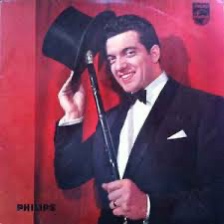
Now Frankie Vaughan’s glory days were a long way behind him but he represented, not quite the old guard at the time, but an artist that many of the middle-aged viewers would have identified with. Frankie, also being a Scouser and apparently a big mate of Tarbie’s (who from Liverpool wasn’t, it seemed?), meant Tarby was effusive in thanking Frankie ‘for coming to support him.’ So much of this show appeared to be about Jimmy Tarbuck.
As a comedian Tarby was nothing special. His material was lightweight and run-of-mill and certainly none of it was written by him, but what made him stand out from a plethora of other comics with similarly lightweight and run-of-the-mill material was his cheeky-chappie demeanour which certainly worked for a while until it became passé. The fact he was a Scouser also helped as everything Liverpudlian was looked upon as ultra-fashionable at that time, which must have appealed to the Palladium producers, and to be fair, he was confident and he was very professional in his delivery and his compereing was slick. Like so many other Scouse entertainers who made a decent career out of being working-class (Cilla, Doddy, Askey), in their private lives they were only too happy to turn their backs on that and be subsumed into the Tory fold, humbly accept their OBEs or MBEs and, in Tarby’s case, spend most of the time at the golf club with Brucie, Henry and Ronnie. In fact, when his career began to flag, golf became to Tarby what Schnorbitz became to Bernie Winters. A crutch which just about kept him in the public eye. For a while, at least. When Margaret Thatcher turned 60 Tarby actually baked her a birthday cake. It’s not on record as to what The Iron Lady thought of it, however. But he did have a bit of time on his hands.
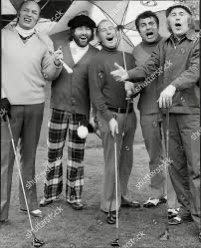
Tarby would, of course, get his own show with its predictable brand of humour and guests and he would also get a few quiz show hosting gigs. Tarby’s Frame Game, Full Swing ( ah yes, the customary golfing reference) and, probably the most remembered, Winner Takes All. Remembered by the likes of me for it’s utter tediousness but who could forget Tarby’s immortal words, Next question please, Geoffrey? Unbelievably, this show endured from 1975 until 1988, Tarby jumping ship in 1986 to, presumably, play more golf and fund-raise for the Tories.
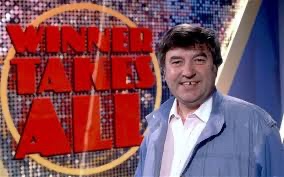
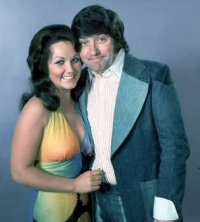
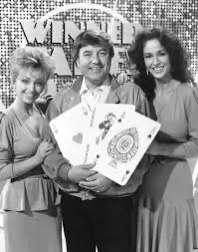
Another strange interlude took place on this 1965 Palladium show when actress Sara Miles, who was starring in the current box office blockbuster Those Magnificent Men In Their Flying Machines, was introduced by Tarby as ‘a beautiful bird‘ and a slightly awkward routine took place where Miles was supposedly trying to publicise her new film and Tarby was trying to stop her. She was eventually left to introduce the next acts and she either got them wrong or this was part of the schtick. Either way, The Searchers new song, When I Get Home, was introduced by that ‘beautiful bird‘ as Wait Till I Get You Home, which was actually quite funny. Certainly funnier than anything Tarby did all night.
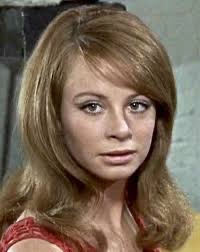
The rest of the line-up for that show was a curious blend of the old, for which the Palladium was associated, and the very new, for which it certainly wasn’t.
Old school acts that evening in 1965 included Edmund Hockridge, Canadian baritone singer from many musicals and ex of Geraldo’s Orchestra and Susan Lane (no, me neither) who screeched for 2 minutes before being replaced on a typically London Palladium revolving stage by those well groomed, unthreatening 60s chart toppers The Searchers (who were pretty good to be fair) with another odd singing drummer.
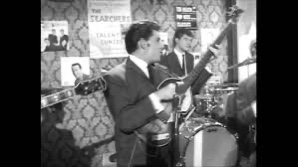
A nod to this time of pretty cataclysmic societal change was the appearance of Peter, Paul and Mary. Stalwarts of the Greenwich Village protest movement, they sang three songs, mostly standards, Gordon Lightfoot’s In The Early Morning Rain, Ewan McColl’s The First Time Ever I Saw Your Face and religious ballad If I Had My Way. They were certainly given a decent amount of stage time but whether anyone in the audience knew what they stood for is uncertain.
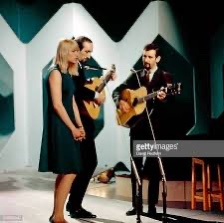
And talking about cataclysmic, however, top of the bill were Peter Cook and Dudley Moore. Yes, top of the bill! If ever an act was completely at odds with what Sunday Night at the London Palladium stood for it was Pete and Dud. If The Beatles dominated popular culture during the mid-sixties, Pete and Dud dominated grown-up, sophisticated comedy. Their series Not Only..But Also.. had premiered in late ’64 and their first series in January 1965. Cook and Moore had been at the centre of the satire boom in 1962-63 with Beyond The Fringe with Alan Bennett and Jonathan Miller, and then the short-lived That Was The Week That Was which Cook had written sketches for. It was rumoured at the time that producer Ned Sherrin had created TW3 for Cook to anchor but while he was away in the US performing BTF, the project was hijacked by David Frost.
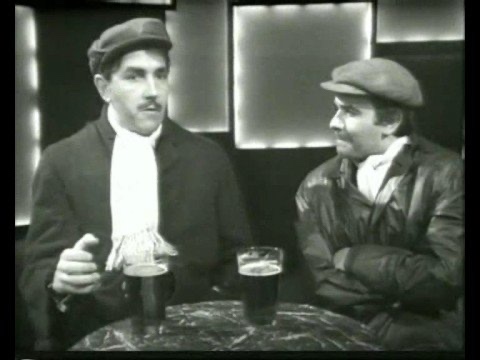
But from BTF, Not Only ..But Also was created, and although it was originally supposed to be a solo project for Moore, Cook was brought in at a later stage and the rest is history, although history that was criminally wiped by the BBC and only a few episodes survive intact.
Coming on the back of the huge success of That Was The Week That Was, NOBA struck a chord with a younger audience that was looking for something different and a little more challenging and provocative after the 50s and early 60s diet of predictable, formulaic comedy and entertainment that was embodied by SNATLP and a plethora of sitcoms broadcast at the time. It was no coincidence that John Lennon appeared in two early episodes of NOBA giving it his endorsement just before Pete and Dud’s Palladium appearance. This, of course, cemented NOBA’s alternative, anti-establishment credentials although this was hardly necessary for most fans.
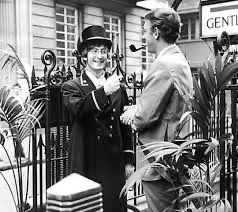
It’s unknown why the Palladium producers decided to invite Pete and Dud to perform but the fact they were top of the bill suggests they were so popular with sections of the public that they had no choice but to feature them. Pete and Dud’s sketch involving their two most popular characters, the characters that completely epitomise their type of humour were, oddly enough, ‘Pete and Dud‘. Or The Dagenham Dialogues as they were known, where lugubrious know-all Pete pontificates on all aspects of life, whether he knows about it or not, while pretty thick, scruffy Dud tends to agree and enter into conversation, usually unsuccessfully. Any description of the routine fails totally to encompass how brilliantly funny and surreal these sketches were. Cook would unashamedly try to get Dud to corpse during the sketch which added to the genius. These sketches would go on for 10 mins or more and, incredibly, the sketch on SNATLP continued for an unprecedented 13 minutes. Much of it seemed improvised and Dud did corpse at one point. They finished with their famous outro from NOBA, Goodby-eee, which, incidentally, got to number 18 in the Hit Parade in 1965, maybe another reason why they were invited on to the show, they even performed it on Ready Steady Go that year. Half way through the song they were faded out and the ATV logo appeared. The famous rotating stage end-sequence didn’t happen as Pete and Dud must have overrun. And that was very unusual for the Palladium.
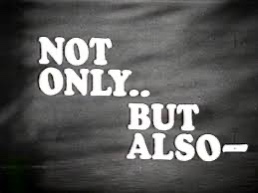
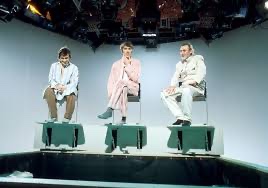
One wonders why Pete and Dud accepted this invitation as SNATLP was the type of show they would have unmercilessly taken the piss out of, particularly if some Royal personage had been present. On the one hand they probably found it quite funny that their brand of anti-establishment humour was being performed and broadcast to vast swathes of people in the theatre and TV audience who just wouldn’t get it and might even have been the type of people lampooned in their shows. Certainly laughter from the audience was muted, not to mention nervous. Many just didn’t know where and when to laugh. Jimmy Tarbuck definitely got bigger laughs, but then he would, wouldn’t he? On the other hand, however, all performers want an audience and the bigger the better, so to perform in front of an audience of 15 million must have seemed attractive in a nicely subversive way. Especially with establishment favourites like Mike and Bernie Winters and Tarby (despite his working class credentials) watching. One wonders what they thought of this almost revolutionary brand of humour, although you can probably guess.
Given the cultural vandalism which resulted in much of Pete and Dud’s comedy being destroyed, this footage is a wonderful example of just how brilliant they were and it should be broadcast permanently in a comedy museum (if there was one) to show what being creative, surreal, funny and stretching the comedy boundaries is all about.
Putting this particular 1965 edition of SNATLP into context, it was an uneasy balancing act between the old and the new. The show still had to appeal to its core audience who wanted ‘nice’, unthreatening and well-established acts but it also knew a massive, for the first time, demanding, young audience was waiting in the wings and its survival depended on carrying many of these young, and many older less conservative, people along. Jimmy Tarbuck was carefully chosen by the producers in the hope of appealing to both sets of viewers, his working-class, cheeky-chappie, Scouse credentials appealing to the young while his predictable, unchallenging, conventional brand of humour to the legions of older viewers.
This 1965 show provides a fascinating microcosm of British society at the time with Tarby at the centre of it. Tarby’s reputation didn’t last long. A younger, more sophisticated audience saw right through him as a willing part of the showbiz and social establishment delivering a type of humour that just seemed tired, old-fashioned and cliched . But for a short, very exciting time, he was the unlikely great working-class hope of an entertainment industry and society that was changing rapidly.
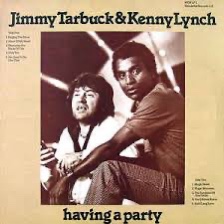
Now I don’t normally do this but…..
…I happened to watch another episode of Sunday Night at the London Palladium last Sunday and felt the need to share this experience as, despite everything I’ve written above, this episode really had to be seen to be believed. Once again, it wrestled with the conflicts of a changing society, a rapidly shifting audience in terms of age, attitudes and interests and it blindingly fails on most levels.
In this edition, broadcast three weeks after the episode described above, it follows the same format and Jimmy Tarbuck is definitely settling into his new role. He’s still quick, quite professional but fluffs a few lines. But rather than incorporate these into his act and get bigger laughs, he, almost apologetically, points them out to the audience as if he should be upfront admitting to such faux pas. My theory as to why he does this is twofold. Firstly, he’s still so stunned at getting such a high profile, prestigious gig he feels he’s letting the middle to upper class audience down because he so much wants to be one of them. And, secondly, he struggles to be spontaneously funny as he is a deliverer of gags rather than a creator of them, as were most comedians in those days. He could never have been called a ‘funny man.’
So who do we have for our entertainment delectation this week? You may well ask, and in terms of strangeness it’s a line up which screams ’60s!!!,’ with more than a generous dash of weirdness thrown in.
First up, gangster film heavyweight, George Raft. An odd choice you might think and you’d be right. After some lightweight banter with Tarbie anyone would think, ‘Well that’s that over with. Who’s next up?’ But, wait, Raft is far from finished. ‘And I believe you were once a dancer?’ prompts Tarbie. And as the Jack Parnell Orchestra strikes up, George Raft, who was 70 at the time, launches into a dance routine that would not have looked out of place in a Soho strip joint. A dance so camp, performed by a septuagenarian New York tough guy which continued for about five minutes. As strange an opening salvo as you could ever imagine. It’s well documented that George Raft‘s film career dried up during the 50s and Tarbuck just compounded the embarrassment by revealing to the audience just how ‘available’ he was after he had performed,’ And thanks to George Raft for appearing at such short notice…’
But now something for the youngsters. An almost forgotten duo of the type that don’t exist anymore. Put your hands together for Paul and Barry Ryan! Now this pair are very interesting. Identical twins (although they didn’t look that identical to me) of 50s singer Marion Ryan. They were just starting out in the business when they made this SNATLP appearance. I was struck about how lonely they looked together on the vast Palladium stage with just a single microphone for company and how confident they must have had to be to stand there just singing, not even having a guitar to strum. In 1967 this sort of pressure proved too much for Paul Ryan who left the act to concentrate on writing songs for his brother’s solo career. Paul Ryan had some success and wrote a couple of songs that were taken up by Frank Sinatra, amongst others (OK, Dana). One was released as a single, I Will Drink The Wine, which got to No. 16 in the UK charts in 1971 and Sunrise in the Morning, both appeared on Frank’s 1971 album ‘Sinatra and Company‘, which must have been a nice little earner for Paul. He also wrote his most famous song, the wonderfully bombastic ‘Eloise‘, for his brother, which got him to No. 2 in 1968, The Damned’s version getting to No.3 in 1986.

The song they sang on SNATLP was odd. It was their first hit record achieving a high of No. 13, ‘Don’t Bring Me Your Heartaches,’ it told the story of a doomed romance from a first person perspective. With two identical twins singing identical words it had the feel, to me, of David Cronenberg’s rather sleazy Dead Ringers. This obviously wasn’t the intention but I couldn’t help noticing an amusing strangeness to the whole act. Paul Ryan died, sadly, at the young age of 46 but Barry’s life took an interesting turn in 1978 when he married Tunku (Princess) Miriam binti al-Marhum Sultan Sir Ibrahim, the only daughter of the ‘fabulously wealthy’ Sultan Ibrahim of Johor. The marriage ended in divorce two years later, but what a rollercoaster ride that must have been! Nicely done, Baz.
The star of the show, however, was magician David Nixon. A ubiquitous presence in so many 60s TV programmes, his smooth, articulate style lent itself to live TV. Everyone over the age of 55 will remember David Nixon, no one under 55 will. As well as having a number of variety vehicles showcasing his magic skills, Nixon was a great favourite of panel shows given his effortless ability to talk and be witty in any situation. A long-time panelist on the TV and radio versions of What’s My Line (what an innocent and very un-modern show that was) he introduced the legendary Basil Brush to the airwaves. He even received the highest honour bestowed on any 60s or 70s celebrity worth their salt, a mention in a Half Man, Half Biscuit song (Reflections In A Flat).

Nixon’s act was quite something, in more ways than one. He invited a participant from the audience up on to the stage to help him. The individual invited looked like he’d been hewn out of 50s rock. Tweed suit, brylcreemed hair, pencil moustache. Reg Thompson (for it was he) sat on a chair as Nixon smoothly explained what was going to happen while asking Reg a few details about himself. ‘Do you mind if I ask you what you do for a living?’ schmoozed Dave. Yes, Reg did mind as it happened, which was the only time Nixon appeared slightly non-plussed. The act involved both participants puffing on a fag before Nixon told a very 60s gag which made him out to be, at worst, a rapist and, at best, a sexual predator. But it got a laugh, obviously! The trick was quite sensational and made me realise how interesting a good and slickly performed magic act can be. And David Nixon really was good. He was the sort of TV personality that it was difficult to imagine living an ordinary life. You could really only imagine David Nixon being on telly.
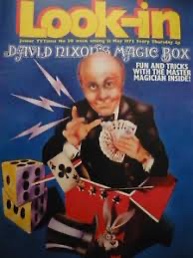
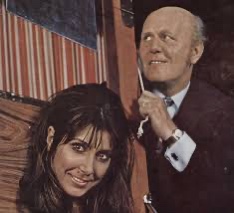
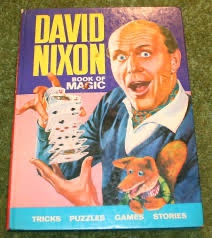
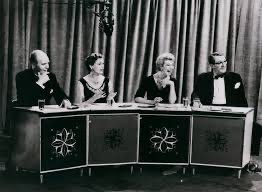
And talking of omnipresent 60s TV personalities, next up, the one and only Mr. Russ Conway! Russ, probably a bit like David Nixon, and Paul and Barry Ryan for that matter, are the kind of TV personalities who were never off the telly in the 60s but would struggle to get a gig today. Russ Conway was a very good-looking pianist who had a load of hits in the 50s and early 60s but his chart days were well behind him. He was still a popular guest on variety shows, however, the perfect act to break up the singer and the comedian, and in this case the magician. He played a rather overblown orchestral piece (well, it was the Palladium I suppose) and then his latest single which was a very jaunty, tinkly little number entitled The Beggars of Rome. By the sound of this piece, they must be the happiest beggars in the world. Russ decided to add one of his own compositions to the ‘B’ side of his record, a down-and-out companion piece called The Urchins of Paris. A laugh a minute on both sides. I really wanted to hear him play Conway classics such as Roulette or Sidesaddle but he wasn’t having it.
Now it was time for that regular feature, ‘Celebs in the Audience’! And what a bunch they had this week, a typically odd triumvirate. Let’s start with Scouse welterweight boxer (and personal friend of Tarby, obviously) Alan Rudkin. Next up, bizarrely, about to take part in Miss World 1965 at the Mecca Ballroom, Miss South Africa, the whiter than white, Carol Davies! And finally 50s crooner Dickie Valentine. I wonder if those individuals were paid to come and sit through this weird hour of light entertainment?

After this parade of Palladium favourites the producers realised that their slightly less traditional viewers might want something a little more challenging, so who better than Spike Milligan to perform this role? Spike’s stand-up routine was erratic to say the least. A few inspired, quite irreverent gags and a few puerile playing-to-the-galleries attempts at humour. He certainly didn’t hit the heights that Pete and Dud did a few weeks before, but he maintained the Palladium policy of highlighting ‘new’ off-beat comedy acts. The Palladium audience didn’t quite know what to make of Spike but giggled at his daftness, probably not really understanding what he was all about.
At the end of his act the curtains parted to reveal the famous Palladium revolving stage with all the acts waiting to wave goodbye to the theatre and TV audience. In fact, the stage hadn’t begun revolving and with the curtains suddenly opening it caught the performers on the hop and as it juddered into motion a few half-hearted waves began.
In another article above I quoted someone as saying ‘It’s only a small step from light entertainment to surrealism.’ One needs only to watch an episode of Sunday Night at the London Palladium to realise just how true that statement is.
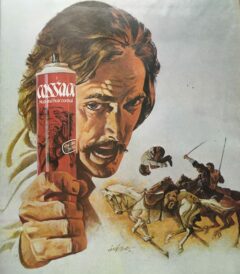
[…] Tarbuck Memories: Sunday Night at the London Palladium […]
[…] Tarbuck Memories: Sunday Night at the London Palladium […]